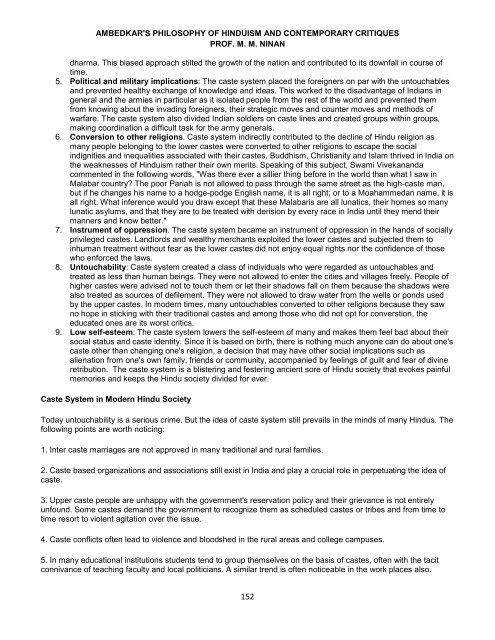Ambedkar-Philosophy of Hinduism
You also want an ePaper? Increase the reach of your titles
YUMPU automatically turns print PDFs into web optimized ePapers that Google loves.
AMBEDKAR'S PHILOSOPHY OF HINDUISM AND CONTEMPORARY CRITIQUES<br />
PROF. M. M. NINAN<br />
dharma. This biased approach stilted the growth <strong>of</strong> the nation and contributed to its downfall in course <strong>of</strong><br />
time.<br />
5. Political and military implications: The caste system placed the foreigners on par with the untouchables<br />
and prevented healthy exchange <strong>of</strong> knowledge and ideas. This worked to the disadvantage <strong>of</strong> Indians in<br />
general and the armies in particular as it isolated people from the rest <strong>of</strong> the world and prevented them<br />
from knowing about the invading foreigners, their strategic moves and counter moves and methods <strong>of</strong><br />
warfare. The caste system also divided Indian soldiers on caste lines and created groups within groups,<br />
making coordination a difficult task for the army generals.<br />
6. Conversion to other religions. Caste system indirectly contributed to the decline <strong>of</strong> Hindu religion as<br />
many people belonging to the lower castes were converted to other religions to escape the social<br />
indignities and inequalities associated with their castes. Buddhism, Christianity and Islam thrived in India on<br />
the weaknesses <strong>of</strong> <strong>Hinduism</strong> rather their own merits. Speaking <strong>of</strong> this subject, Swami Vivekananda<br />
commented in the following words, "Was there ever a sillier thing before in the world than what I saw in<br />
Malabar country? The poor Pariah is not allowed to pass through the same street as the high-caste man,<br />
but if he changes his name to a hodge-podge English name, it is all right; or to a Moahammedan name, it is<br />
all right. What inference would you draw except that these Malabaris are all lunatics, their homes so many<br />
lunatic asylums, and that they are to be treated with derision by every race in India until they mend their<br />
manners and know better."<br />
7. Instrument <strong>of</strong> oppression. The caste system became an instrument <strong>of</strong> oppression in the hands <strong>of</strong> socially<br />
privileged castes. Landlords and wealthy merchants exploited the lower castes and subjected them to<br />
inhuman treatment without fear as the lower castes did not enjoy equal rights nor the confidence <strong>of</strong> those<br />
who enforced the laws.<br />
8. Untouchability: Caste system created a class <strong>of</strong> individuals who were regarded as untouchables and<br />
treated as less than human beings. They were not allowed to enter the cities and villages freely. People <strong>of</strong><br />
higher castes were advised not to touch them or let their shadows fall on them because the shadows were<br />
also treated as sources <strong>of</strong> defilement. They were not allowed to draw water from the wells or ponds used<br />
by the upper castes. In modern times, many untouchables converted to other religions because they saw<br />
no hope in sticking with their traditional castes and among those who did not opt for converstion, the<br />
educated ones are its worst critics.<br />
9. Low self-esteem: The caste system lowers the self-esteem <strong>of</strong> many and makes them feel bad about their<br />
social status and caste identity. Since it is based on birth, there is nothing much anyone can do about one's<br />
caste other than changing one's religion, a decision that may have other social implications such as<br />
alienation from one's own family, friends or community, accompanied by feelings <strong>of</strong> guilt and fear <strong>of</strong> divine<br />
retribution. The caste system is a blistering and festering ancient sore <strong>of</strong> Hindu society that evokes painful<br />
memories and keeps the Hindu society divided for ever.<br />
Caste System in Modern Hindu Society<br />
Today untouchability is a serious crime. But the idea <strong>of</strong> caste system still prevails in the minds <strong>of</strong> many Hindus. The<br />
following points are worth noticing:<br />
1. Inter caste marriages are not approved in many traditional and rural families.<br />
2. Caste based organizations and associations still exist in India and play a crucial role in perpetuating the idea <strong>of</strong><br />
caste.<br />
3. Upper caste people are unhappy with the government's reservation policy and their grievance is not entirely<br />
unfound. Some castes demand the government to recognize them as scheduled castes or tribes and from time to<br />
time resort to violent agitation over the issue.<br />
4. Caste conflicts <strong>of</strong>ten lead to violence and bloodshed in the rural areas and college campuses.<br />
5. In many educational institutions students tend to group themselves on the basis <strong>of</strong> castes, <strong>of</strong>ten with the tacit<br />
connivance <strong>of</strong> teaching faculty and local politicians. A similar trend is <strong>of</strong>ten noticeable in the work places also.<br />
152


















